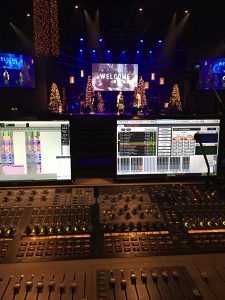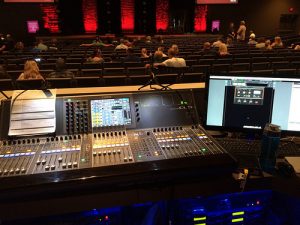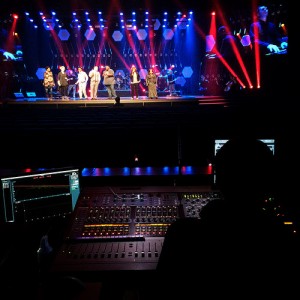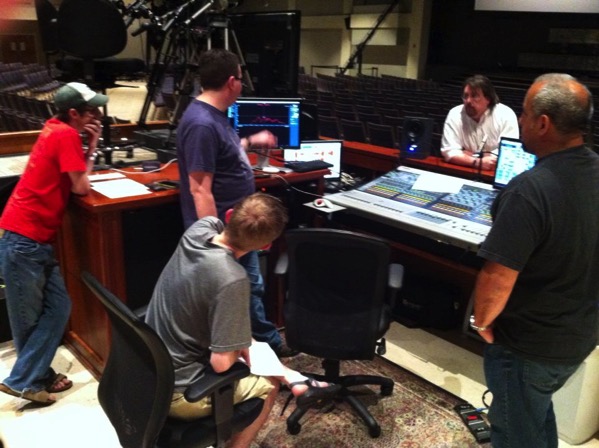
Developmental Offerings
I believe audio in churches can and should be great whether you’re in the smallest church or the biggest mega-church. I also believe one of the best ways to make this happen comes from passing down what we know.
One of the values I loved about North Point was a simple value Andy Stanley describes with the phrase “empty your cup.” To “empty your cup” simply means to share what you know. You might not know everything and you might not have all the answers, but you still share what you know and what you’ve learned.
I think one of the reasons why audio at North Point has been great through the years stems from this simple concept. Our audio staff members would regularly get together to empty our cups amongst each other which we in turn would empty back into our volunteers.
As I mentioned, I believe audio in churches can and should be great, and that’s why I’m spending a large part of my post-North Point career “emptying my cup” into other churches and engineers.
The end of the year is coming which means many of you are starting to plan for the new year. As you’re thinking about the ways you’re going to move forward in the coming year, I wanted to let you know about some new offerings I have available for taking your audio game to the next level.
My primary development program is On-site Mix Coaching & Development. I find this is best for up to 3 engineers(staff and/or volunteer) at a time, and my primary goal is to meet you where you’re at and offer some strategies for moving forward.
One of the things I learned leading audio teams for the last 11 years is not everyone is at the same level. One engineer may need help with a specific instrument like vocals or drums, another may need help with musicality, and yet another may just need the basics. This program is custom tailored to each engineer and comes from my years of leading engineers as well as the mentoring sessions I personally received over the years.
One of my latest offerings is Distance Mix Coaching & Development. These sessions are up to one hour in length and take place over the phone, Skype, or FaceTime. These are one-on-one sessions, and the goal follows along the same lines of my on-site coaching: to meet you where you’re at.
While it’s somewhat difficult for me to demonstrate actual techniques the way I can on-site, topics within sessions may still range from mix techniques to board mix evaluations to working with volunteers to best practices for leading your team.
Part of the inspiration for this came from the countless hours I spent talking with other engineers over the years of my career. It has been invaluable to me as an engineer to talk with more experienced engineers over the years to get wisdom and new ideas while also having a sounding board I could bounce my own ideas off. I know it can be difficult for a lot of church audio engineers to find expert engineers within their churches and communities to have these kinds of conversations so I have created this as an option.
Another new offering I have are topic specific Workshops. These are designed for small to medium-sized groups ranging from from 3-25 staff or volunteer engineers. These are great options to invest in your engineers if you lead a larger team or have engineers spread throughout your church in different ministries and/or across multiple campuses. These are also great options if you’re looking to partner with other churches in your community for development opportunities. I have full-day and half-day workshops available. Half-day workshops tend to be more specific in focus and are great opportunities for mid-week training. Two half-day workshops may also be paired together for a full day deposit in your team. You can view a full list if you click HERE. I would, however, like to highlight a couple of these to give you an idea of what’s available.
My flagship workshop is Priority Mixing. Time is often a resource in short supply when it comes to mixing so it’s imperative for live engineers to get a mix up relatively quickly. In this one day workshop I outline and demonstrate how to go for the big mixing wins first so your time is maximized on the things that matter most in a mix.
Look, I’ll be honest, there is a textbook/standard approach to mixing that is commonly taught, but it has always been interesting to me that very few of the engineers I admire and who influenced me the most subscribe to it. Priority Mixing is an alternate approach to what is commonly taught and is a hybrid approach blending aspects of the traditional approach to mixing with an approach I find more in-line with how many A-List mixers work. Adopting this approach was a big step for me in achieving the mixes I heard in my head.
While Priority Mixing is a big picture mixing workshop, I touch on many of the things I see engineers struggle with that often eluded me in the early years of my career such as:
– How and where to sit the vocals
– How to create space for instruments to sit together
– Relationships between instruments
– Listening strategies
– Achieving a solid low-end that doesn’t upset everybody
– Musicality, or in other words, breathing life into a static mix
Another workshop I’d like to highlight is a half-day workshop on Measurement for Mixing which focuses on the use of measurement equipment specifically for mixing. Real-Time Analyzers, or RTA’s, are becoming ubiquitous in the world of mixing and can be found anywhere from PC’s to tablets to smartphones. Many consoles and plug-ins even feature an RTA these days. The trouble is, just because they’re available doesn’t mean they are easy to use.
I believe audio measurement equipment is an incredibly powerful tool for mixing, and this workshop focuses on strategies for setting up an RTA, using it for mixing and ear training, and most importantly, understanding its presented information.
If these sound like they could help you and your team in 2016 or you’d like to find out more, please click HERE to contact me or click the Contact button above.


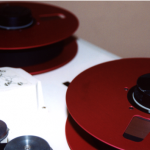 Previous Post
Previous Post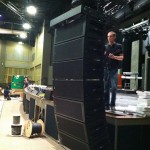 Next Post
Next Post
